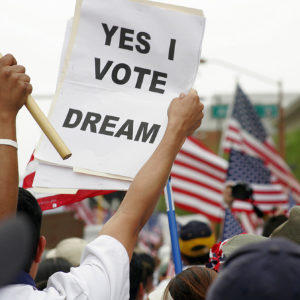This month, a new “public charge” proposal was posted in the Federal Register and opened to public comments for 60 days. This proposed “public charge” policy aims to disqualify immigrants who have undergone all of required administrative requirements to live in the United States from obtaining green cards if they used certain forms of public benefits including food stamps, Medicaid or public housing.
Hidden behind the veil of “economic self-sufficiency,” this proposal is yet another pillory on our immigrant brothers and sisters, specifically the Latinx and Asian-American and Pacific Islander populations. This attempt at removing immigrants on a basis unrelated to legal status is shutting the doors on our own people — it only serves to punish the disenfranchised and underserved folks who have come to our country to seek a better life and make underrepresented people suffer. This is undeniably wrong.
The growing field of eligible voters and the changing demographics of our nation indubitably mean that immigrants and people of color play a significant role in American democracy and economy; President Trump’s actions against these very communities are detrimental to our American democracy and economy.
After all, the data tell us that immigrant and underrepresented communities contribute tremendously to our country. For instance, in 2017, 86 percent of scaled ($1 million-plus) immigrant-owned firms were owned by millennials who immigrated as children. Over the last five years, Latina/o degree attainment has increased significantly. In 2015, Latina/o households contributed almost $215 billion to U.S. tax revenues as a whole, including almost $76 billion in state and local tax payments. Between 2015 and 2020, a projected 5.7 million Latina/os will gain eligibility to vote for the first time, most by turning 18 and aging into the electorate. We are, without question, here.
Yet, the burden some of us feel is a heavy sense of powerlessness in wanting to do more, but not knowing what that now means light of the fact that our immigrant sisters’ and brothers’ sense of humanity is questioned on a daily basis.
The seeming powerlessness is exemplified in the messages we hear from an administration praising voter identification laws that hinder the Latino and black vote.
The burden is also demonstrable through the dialogue around family separation at the border, ultimately leading to a philosophical discourse around who is to be considered a person deserving of moral and political will in our country. Public shaming for speaking Spanish, people being killed for raising their voice against racism, and the general rhetoric against our community have created a hostile environment leaving many of us to question our place in our own home.
Yet, we must engage in civic discourse and actions, otherwise we normalize violence against underrepresented people and enable the practitioners of intolerance, hatred and abuse of power. All is not lost: We must become involved in the political processes in our community. Everything around us — our schools, our jobs and our neighborhoods — is governed by political forces, and there are opportunities, even in spaces where we think we may not belong, to engage in the political processes governing our lives.
For instance, people in our community can run for office; apply for municipal boards and commissions, as well as boards of nonprofits; volunteer for organizations that align with one’s personal beliefs; and speak in forums, online and in person, at every opportunity. Ultimately, political parity for Latina/os and other underrepresented groups will come only by disrupting the beliefs of the current administration, which values the lives of one group over others, and we must pursue such change every single day.
Immigrants, women and underrepresented groups bring value to our country, and this must be a narrative we use regularly to chip away at the xenophobic dialogue that has spread across our country, and the rest of the world. And we must now use our presence to project our voices into larger conversations of policy at the national level. Doing so begins with the most important action we can take: the cast of a vote.
It is up to us to make our leaders at all levels responsible for their promises made via campaign rhetoric. Remember, they work for us. Choose leaders who support your community, and for those who are already in charge, demand them to stand for justice in word and deed. Register to vote, join organizations that help you elevate your civic participation. Stay informed about elections and about who represents you. Remember their actions when voting.
Let’s take action and create a community with dignity for all.

